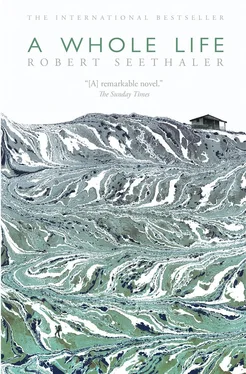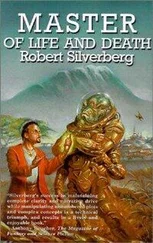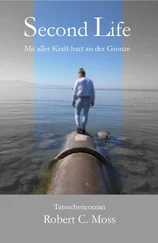Robert Seethaler - A Whole Life
Здесь есть возможность читать онлайн «Robert Seethaler - A Whole Life» весь текст электронной книги совершенно бесплатно (целиком полную версию без сокращений). В некоторых случаях можно слушать аудио, скачать через торрент в формате fb2 и присутствует краткое содержание. Год выпуска: 2015, Издательство: House of Anansi Press Inc, Жанр: Современная проза, на английском языке. Описание произведения, (предисловие) а так же отзывы посетителей доступны на портале библиотеки ЛибКат.
- Название:A Whole Life
- Автор:
- Издательство:House of Anansi Press Inc
- Жанр:
- Год:2015
- ISBN:нет данных
- Рейтинг книги:4 / 5. Голосов: 1
-
Избранное:Добавить в избранное
- Отзывы:
-
Ваша оценка:
- 80
- 1
- 2
- 3
- 4
- 5
A Whole Life: краткое содержание, описание и аннотация
Предлагаем к чтению аннотацию, описание, краткое содержание или предисловие (зависит от того, что написал сам автор книги «A Whole Life»). Если вы не нашли необходимую информацию о книге — напишите в комментариях, мы постараемся отыскать её.
Set in the mid-twentieth century and told with beauty and tenderness, his story is one of man's relationship with an ancient landscape, of the value of solitude, the arrival of the modern world, and above all, of the moments, great and small, that make us who we are.
A Whole Life — читать онлайн бесплатно полную книгу (весь текст) целиком
Ниже представлен текст книги, разбитый по страницам. Система сохранения места последней прочитанной страницы, позволяет с удобством читать онлайн бесплатно книгу «A Whole Life», без необходимости каждый раз заново искать на чём Вы остановились. Поставьте закладку, и сможете в любой момент перейти на страницу, на которой закончили чтение.
Интервал:
Закладка:
It was weeks before the fragments of individual accounts were pieced together and the valley dwellers were able to put what had happened that night into some kind of order in their minds. The avalanche had come at two thirty in the morning. A huge lump of snow had detached itself from a cornice about fifty metres below the Almerspitze and had plunged down the mountain with considerable force. As the terrain where it broke off was almost vertical, the avalanche swiftly gained speed, leaving a trail of devastation as it hurtled down into the valley. The mass of snow thundered past just behind the village and all the way across to the far side of the valley, where it triggered a smaller, secondary avalanche whose northern fringes reached as far as the Bittermann & Sons camp, finally coming to a standstill just an arm’s length from Thomas Mattl’s old bathtub. The avalanche uprooted the forest and swept it along with it, leaving a deep trough that extended all the way to the hillock beside the village pond. The villagers reported hearing a muffled detonation followed by a rushing or roaring sound, like the galloping of an enormous herd of cattle descending the mountain and rapidly approaching the village. The shock wave made windows tremble, and everywhere Madonna figurines and crucifixes fell from the walls. People fled their houses and ran out into the street, ducking their heads beneath a cloud of snow dust that seemed to swallow the stars. They gathered in front of the chapel, and the avalanche’s dying rumbles were accompanied by a whispered chorus of women praying. Slowly the snow cloud settled, coating everything in a fine white layer. A deathly silence lay over the valley and the inhabitants knew that it was over.
The damage was devastating, far worse even than the great avalanche of 1873, which a couple of the oldest villagers thought they still remembered: at the Ogfreiner farm sixteen crosses carved into the family altar bore silent witness to its sixteen buried souls. This time four farms, two large haystacks and the mayor’s little mill in the mountain stream as well as five workers’ cabins and one of the camp latrines were completely destroyed, or at least substantially damaged. Nineteen cows, twenty-eight pigs, countless chickens and the only six sheep in the village all met their deaths. Their cadavers were dragged out of the snow by tractors or with bare hands and burned with the wooden debris that couldn’t be reused. The stench of burnt flesh hung in the air for days and masked the smell of spring, which had now definitely arrived, melting the snow masses and revealing the full extent of the disaster. Nonetheless, on Sunday the villagers gathered together in the chapel and thanked the Lord for his goodness, for only divine mercy could explain why the avalanche had taken the lives of no more than three people: the venerable old farming couple Simon and Hedwig Jonasser, whose house had been completely encased in snow and who were found, after rescuers had worked their way through to the bedroom, lying in bed in each other’s arms, cheek to cheek, asphyxiated; and the maid from the guesthouse, Marie Reisenbacher, Andreas Egger’s young bride.
The men from a rescue team hastily assembled on the night of the disaster found Egger’s cabin swallowed by the snow and Egger himself lying doubled up beside a hole he had dug in the snow with his bare hands. They told him afterwards that he didn’t stir as they approached the scene, and none of them would have bet so much as a groschen that there was any life left in that dark heap of a man. Egger couldn’t remember a single detail of his actual rescue, but the dreamlike image of torches emerging from the darkness of the night and moving slowly towards him, wavering like ghosts, remained with him till the day he died.
Marie’s body was recovered, laid out in the chapel beside the Jonassers, and buried in the parish cemetery. The funeral took place in radiant sunshine with the first bumblebees buzzing over the turned earth. Egger sat on a stool, sick and rigid with sorrow, accepting people’s condolences. He didn’t understand what they were saying to him, and their hands felt as if they were foreign objects being given to him to hold.
In the weeks that followed, Egger found accommodation at the Golden Goat. Most of the time he lay in bed in a tiny room behind the laundry which the innkeeper had offered for him to use. His broken legs took a long time to heal. The bonesetter Alois Klammerer had died years earlier (cancer ate away his palate, half his jaw and the side of his face so that by the end you could see his teeth through his open cheek as if through a window), so they had to call in the young local doctor, who had moved to the village just last season and was making a living primarily from the sprained, twisted or broken limbs of the tourists who came in ever-increasing numbers for hiking and skiing. Bittermann & Sons paid the doctor’s bill and Egger got two dazzling white plaster casts around his legs. At the end of the second week they stuffed a thick straw pillow behind his back and he was allowed to sit up and drink his milk from a mug instead of slurping it from an earthenware dish. At the end of the third week he was sufficiently recovered that every day, around noon, the innkeeper and the barman would wrap him in a horse blanket, lift him out of bed, and set him down outside the door on a little birchwood bench. From here he could see the slope where his house had stood, and where now all he could make out was a pile of debris illuminated by the warm spring sun.
Towards the end of May Egger asked one of the kitchen boys for a sharpened meat cleaver. He used it to cut and hack away at the plaster casts until he was able to break them into two halves, and his legs emerged. They lay there on the sheet, thin and white like two debarked sticks, looking to him almost more peculiar than a few weeks earlier when he had pulled them, stiff and cold, from the snow.
For a few days Egger dragged his emaciated body back and forth between the bed and the birchwood bench, until at last he felt that his legs belonged to him again and would be strong enough to carry him further. He slipped on a pair of trousers for the first time in weeks and headed off to his plot of land. He walked through the forest where it had been flattened by the avalanche; he looked up at the sky, which was full of small, round clouds, and at the flowers springing up everywhere between the stumps and the uprooted tree trunks: white, egg-yolk yellow, bright blue. He tried to see everything precisely so as to memorize it for later. He wanted to understand what had happened, but when, after several hours, he reached his plot and saw the beams and planks scattered about he knew there was nothing to understand. He sat on a rock and thought of Marie. He imagined what had happened that night, and saw terrible pictures in his mind’s eye: Marie sitting upright in their bed, arms outstretched on the blanket, listening, wide-eyed, into the darkness a second before the avalanche smashed through the walls like a giant fist and drove her body into the cold earth.
* * *
In the autumn, almost half a year after the avalanche, Egger left the valley, moving on to work elsewhere for the company. But he couldn’t do the heavy woodcutting any more.
‘What are we supposed to do with someone like you?’ asked the general manager. Egger had limped in soundlessly across the carpet and was now standing in front of the desk, hanging his head. ‘You’re no good for anything any more.’ Egger nodded, and the general manager sighed. ‘I’m sorry about your wife,’ he said. ‘But don’t go getting the idea that the blasting had anything to do with it. The last blast was a couple of weeks before the avalanche.’
‘I’m not,’ said Egger.
The general manager put his head on one side and stared out of the window for a while. ‘Or do you think perhaps the mountain has a memory?’ he asked abruptly. Egger shrugged. The manager leaned over, made a gargling noise and spat into a tin dish at his feet. ‘All right,’ he said at last. ‘Bittermann & Sons has constructed seventeen cable cars so far, and believe you me, they won’t be the last. People are all going crazy about slithering down mountains on their planks.’ He pushed his dish under the desk with the tip of his shoe and looked at Egger solemnly. ‘God alone knows why,’ he said. ‘At any rate, the cable cars have to be maintained: cables checked, impeller wheels lubricated, cabin roofs seen to and so on. You don’t need solid ground under your feet all the time, do you?’
Читать дальшеИнтервал:
Закладка:
Похожие книги на «A Whole Life»
Представляем Вашему вниманию похожие книги на «A Whole Life» списком для выбора. Мы отобрали схожую по названию и смыслу литературу в надежде предоставить читателям больше вариантов отыскать новые, интересные, ещё непрочитанные произведения.
Обсуждение, отзывы о книге «A Whole Life» и просто собственные мнения читателей. Оставьте ваши комментарии, напишите, что Вы думаете о произведении, его смысле или главных героях. Укажите что конкретно понравилось, а что нет, и почему Вы так считаете.











